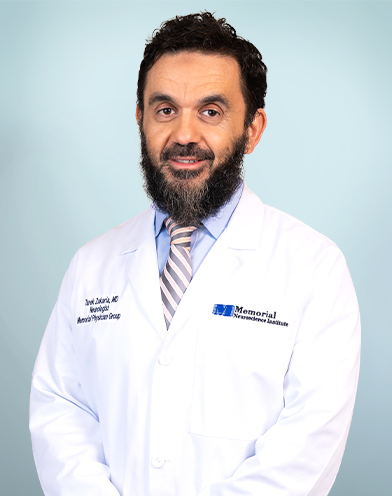Epilepsy Treatment
At our accredited Epilepsy Center, skilled specialists provide the latest epilepsy therapies.
Comprehensive, Personalized Epilepsy Care
Epilepsy is often a life-altering condition. Not knowing when a seizure will occur can affect everything you do. At Memorial Neuroscience Institute, you’ll find advanced treatment options to reduce seizures. In some cases, treatment can help you go seizure-free for long periods of time.
Why Choose Us for Epilepsy Treatment?
 Epilepsy can be complex to diagnose and treat. Our program is accredited by the National Association of Epilepsy Centers as a Level 4 Epilepsy Center (the highest level). This designation means we have expertise in treating the most complex adult epilepsy cases. You receive care from fellowship-trained epileptologists (neurologists with specialized training in epilepsy) and neurosurgeons who work closely together to plan and deliver your care.
Epilepsy can be complex to diagnose and treat. Our program is accredited by the National Association of Epilepsy Centers as a Level 4 Epilepsy Center (the highest level). This designation means we have expertise in treating the most complex adult epilepsy cases. You receive care from fellowship-trained epileptologists (neurologists with specialized training in epilepsy) and neurosurgeons who work closely together to plan and deliver your care.
Learn more about our accredited Epilepsy Center or find out more about pediatric epilepsy care at Joe DiMaggio Children’s Hospital.
Types of Epilepsy Treatments
Advances in care have greatly improved seizure control and the outlook of people with epilepsy. Our Epilepsy Center offers a range of treatments tailored to your unique needs and preferences.
Treatments we offer include:
Medications are typically the first line of treatment for epilepsy and help control seizures for about 70 percent of people. There are many types of antiseizure medications. Finding the medicine and dose that works for you may take time.
Our epileptologists may prescribe one or a combination of medications, depending on factors such as:
- Seizure type
- How often seizures occur
- Other medical conditions you have
- Side effects
If you don’t respond to the first type of medication therapy, we may change the dose or try a second type. If a second medication isn’t effective, studies show additional medications are unlikely to help. Seizures that don’t respond to at least two medications are called refractory or drug-resistant.
For patients with refractory epilepsy, evaluation at a Level 4 Epilepsy Center like ours is critical. We offer intensive diagnostic testing and complete evaluations for epilepsy surgery. Learn more about diagnostic testing for refractory epilepsy.
If medications aren’t effective, a surgical procedure or surgically implanted device may be an option. Our neurosurgeons use the latest technology to perform surgery, including:
- Brain mapping to plan surgery
- Intraoperative imaging to guide surgery
- Robotic arm to reach precise locations in the brain
Our program also features patient navigators who serve as your single point of contact. Navigators guide you through the surgery process and follow-up care and are available to answer any questions.
There are many types of surgical procedures for epilepsy. In general, we group these procedures into two categories:
- Focal treatment: Focal treatment involves eliminating the precise area of the brain where seizures start. It’s an option for focal seizures that begin in a specific location that doesn’t affect important brain functions. Our neurosurgeons may remove brain tissue surgically or use other tools. Laser ablation is a minimally invasive procedure in which the neurosurgeon uses heat energy to destroy a small area of brain tissue.
- Disconnection surgery: This approach is rare in adults. It involves disconnecting the two sides of the brain to stop the spread of seizure activity from one side to the other.
In neurostimulation, a device delivers electrical pulses to the brain to prevent seizures. It’s typically a treatment for focal seizures that don’t respond to medications.
There are several types of neurostimulation devices:
- Vagus nerve stimulation (VNS): VNS sends energy pulses to the brain via the vagus nerve, which carries information between your body and brain. The device consists of a thin wire attached to the vagus nerve in your neck. The wire connects to a small electrical device implanted under the skin of your chest. Once implanted, our neurologists program the device to send out electrical pulses at regular intervals.
- Responsive nerve stimulation (RNS): RNS using the NeuroPace RNS® system involves placing thin wire electrodes where seizure activity starts in your brain. We use a robotic arm to place the electrodes precisely through small incisions just a few millimeters wide. The wires connect to a device implanted in your skull that monitors brain activity. When the device detects a seizure, it sends electrical pulses to your brain to disrupt and stop the seizure.
- Deep brain stimulation (DBS): Deep brain stimulation involves implanting the electrodes in a specific area of your brain. Our neurologists program a device implanted under the skin in your chest to send regular electrical impulses to your brain.
Memorial Neuroscience Institute was the first in South Florida to perform NeuroPace surgery. Our neurosurgeons are also researching ways to broaden the use of NeuroPace to help patients with different types of seizures.
Epilepsy and Pregnancy
With proper planning, people with epilepsy can have healthy pregnancies. If you’re considering pregnancy, we provide comprehensive education and support. We also work with obstetricians and maternal-fetal medicine specialists to provide high-risk pregnancy care. This extra monitoring helps you have the safest possible experience.













